The Story of Professor Earl Lawrence Carl
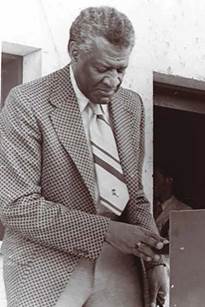 The Institute was named in honor of Professor Earl Carl, a founding faculty member of the Thurgood Marshall School of Law. A symbol of personal triumph over misfortune, Professor Carl is a reminder that we are limited by only the barriers we choose not to overcome. New Haven, Connecticut, the city of momentous anti-slavery events, interestingly was also the birthplace of Earl Carl. Born March 23, 1919, Carl was the only child of proud and supportive parents, Lawrence and Lillian Carl, owners of a catering service and, according to Dr. Carl, his biggest supporters. A bright young man, he could excel in all things despite glaucoma stealing his vision early in life. Blinded yet a visionary, he would never accept biased rejections for himself or anyone nor would he lose sight of his goals. That is not to say his journey was an easy one. Carl attended public school only through his second year of high school, because he was progressively going blind. “I could not understand why this was happening to me. I was a good, all-American boy and had plans to do good and productive things. When this near catastrophe fell upon me, I did not believe that I was really going blind. I thought that any day I would wake up and have 20/20 vision. I waited in vain,” noted Carl of this shocking experience. However, this would only be an obstacle not a stopping point for him.
The Institute was named in honor of Professor Earl Carl, a founding faculty member of the Thurgood Marshall School of Law. A symbol of personal triumph over misfortune, Professor Carl is a reminder that we are limited by only the barriers we choose not to overcome. New Haven, Connecticut, the city of momentous anti-slavery events, interestingly was also the birthplace of Earl Carl. Born March 23, 1919, Carl was the only child of proud and supportive parents, Lawrence and Lillian Carl, owners of a catering service and, according to Dr. Carl, his biggest supporters. A bright young man, he could excel in all things despite glaucoma stealing his vision early in life. Blinded yet a visionary, he would never accept biased rejections for himself or anyone nor would he lose sight of his goals. That is not to say his journey was an easy one. Carl attended public school only through his second year of high school, because he was progressively going blind. “I could not understand why this was happening to me. I was a good, all-American boy and had plans to do good and productive things. When this near catastrophe fell upon me, I did not believe that I was really going blind. I thought that any day I would wake up and have 20/20 vision. I waited in vain,” noted Carl of this shocking experience. However, this would only be an obstacle not a stopping point for him.
“I could not understand why this was happening to me. I was a good, all-American boy and had plans to do good and productive things. When this near catastrophe fell upon me, I did not believe that I was really going blind. I thought that any day I would wake up and have 20/20 vision. I waited in vain.”
— Dr. Earl Carl —
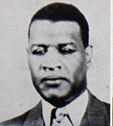 Faced with much adversity, he began his life’s work. Understandably saddened and depressed by his progressive blindness, Earl Carl attended his final 2 years of high school at the Connecticut School for the Blind. There he would encounter peers and teachers who would positively impact his emotional state for a long time to come. Later, happier yet completely blind, he graduated with honors and applied to Fisk University. They rejected him. Undeterred, Earl Carl sought explanation for the rejection and discovered only his blindness prevented his admission. Fisk had no prior experience with a blind student. After much discussion, he was ultimately admitted to Fisk where he proved that blind students, too, could achieve. Carl considered it a compliment when another blind student was admitted to Fisk the following semester. Earl Carl graduated with honors from Fisk University in 1942, receiving a BA in Sociology.
Faced with much adversity, he began his life’s work. Understandably saddened and depressed by his progressive blindness, Earl Carl attended his final 2 years of high school at the Connecticut School for the Blind. There he would encounter peers and teachers who would positively impact his emotional state for a long time to come. Later, happier yet completely blind, he graduated with honors and applied to Fisk University. They rejected him. Undeterred, Earl Carl sought explanation for the rejection and discovered only his blindness prevented his admission. Fisk had no prior experience with a blind student. After much discussion, he was ultimately admitted to Fisk where he proved that blind students, too, could achieve. Carl considered it a compliment when another blind student was admitted to Fisk the following semester. Earl Carl graduated with honors from Fisk University in 1942, receiving a BA in Sociology.
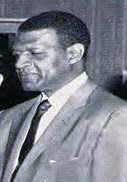 Even looming radicalized rejection and Jim Crow laws could not oppress Carl’s hunger for success. It is no surprise then that when a professor suggested he attend law school Carl did not hesitate. Ultimately, he was offered admission to both Yale and Harvard; however, he chose Yale. This Yale Law School graduate went on to become the first blind black man to be admitted to the Connecticut Bar on July 27, 1948. In 1946, the NAACP, determined to fight the “separate but equal” doctrine, filed suit against the University of Texas in Sweatt v. Painter challenging UT’s decision to refuse admission to their law school to Heman Sweatt, a postal worker, based solely on the fact that he was Black. At the time, Texas had no law schools that admitted Black students. The state of Texas, knowing it could not prevail on equal protection grounds and faced with admitting blacks into the UT Law School, chose to attempt to establish a “negro law school equal to the University of Texas” to circumvent a ruling against the state. However, the NAACP took the position that the educational equality could only be achieved by integration. Ultimately, the US Supreme Court agreed, ruling in Sweatt that a separate school could not be equal.
Even looming radicalized rejection and Jim Crow laws could not oppress Carl’s hunger for success. It is no surprise then that when a professor suggested he attend law school Carl did not hesitate. Ultimately, he was offered admission to both Yale and Harvard; however, he chose Yale. This Yale Law School graduate went on to become the first blind black man to be admitted to the Connecticut Bar on July 27, 1948. In 1946, the NAACP, determined to fight the “separate but equal” doctrine, filed suit against the University of Texas in Sweatt v. Painter challenging UT’s decision to refuse admission to their law school to Heman Sweatt, a postal worker, based solely on the fact that he was Black. At the time, Texas had no law schools that admitted Black students. The state of Texas, knowing it could not prevail on equal protection grounds and faced with admitting blacks into the UT Law School, chose to attempt to establish a “negro law school equal to the University of Texas” to circumvent a ruling against the state. However, the NAACP took the position that the educational equality could only be achieved by integration. Ultimately, the US Supreme Court agreed, ruling in Sweatt that a separate school could not be equal.
The new law school was originally established in Austin and then transferred to Houston where Dr. Raphael Lanier, then president of Texas State University for Negroes in Houston, was charged with building the law school. He contacted Earl Carl during his third year in law school asking for his help. Certainly his race, education, and accomplishments alone made Carl a perfect candidate for the then newly created Law School at Texas State University for Negroes. What the school could have never anticipated was Carl’s life experiences and physical disabilities had created not only a teacher but also a devoted leader. Again undeterred by a challenge, Earl Carl left his friends and family and traveled some 1700 miles to Houston, Texas, where he began his career as an advocate and professor for black (and minority) future lawyers. At the time he was approached to serve as an initial faculty member of the new law school, there were less than 1000 black lawyers in the country. Dr. Carl vowed to “increase the number of minority lawyers in the United States.” During his tenure at TSU, the number of minority lawyers in the country would double. Carl’s appointment at Texas State University for Negroes Law School began September 1, 1948. He would not retire until some 38 years later in 1986. Dr. Carl once noted, “I have had offers to go elsewhere… this is not a job to me. It has been my life. I would not go elsewhere, even to Harvard or Yale, because I have had the 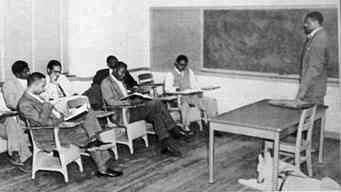 privilege of being a part of this school from the beginning.” At the college, now known as Thurgood Marshall School of Law, he would teach various courses as well as lead the school. He wisely chose to use his professional position to advance a movement - equal and not separate legal education for all.
privilege of being a part of this school from the beginning.” At the college, now known as Thurgood Marshall School of Law, he would teach various courses as well as lead the school. He wisely chose to use his professional position to advance a movement - equal and not separate legal education for all.
“I have had offers to go elsewhere… this is not a job to me. It has been my life. I would not go elsewhere, even to Harvard or Yale, because I have had the privilege of being a part of this school from the beginning.”
A loved and respected husband to Iris Harris Carl and father of two girls, Francine Carl Walker and Nina Carl, Earl Carl would undoubtedly also count among his family his seeing-eye dogs, known to the students as Dundee and Hector. Dr. Earl Carl was a legend. One who at one point had helped “mold the cast” of 20 percent of all minority lawyers in the country, and further was said to have then engineered the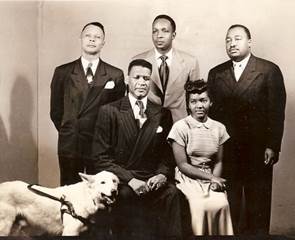 basic development of almost 75 percent of Texas minority lawyers. During his tenure, the enrollment at Thurgood Marshall School of Law quadrupled, and the number of minority attorneys across the United States doubled. Carl served under six university presidents, saw the name of the university and law school change, witnessed the number of law faculty quadruple, and observed the transitions the law school underwent when its facilities moved to different locations four times. He wrote extensively about the need for black lawyers and exemplified the positive aspects of legal professionals in all parts of his life. Giving back to the community was something he did constantly. Notably, Professor Carl served as an attorney of record in Fisher v. Carrousel Motor Hotel, a landmark case wherein the Texas Supreme Court found that where a restaurant employee grabbed a plate from a black customer, yelling in a loud voice, “a Negro could not be served in the club,” such conduct amounted to battery. Professor Carl served as interim dean of the law school from 1958 – 1959 and 1976 – 1978. While he enjoyed this experience, he preferred interactions with students. “As the dean, I taught only one course a semester.” “I am basically a classroom person. I enjoy working with students, watching them grow and having contact with them. “Academic and professional organizations honored him many times, and he received honors of Distinguished Professor and Professor Emeritus from the TSU Board of Regents. He received the “Professor of the Year” award many times during his career. Former Houston Mayor Fred Hofheinz proclaimed March 23, 1974, “Earl L. Carl Day” in recognition of Dr. Carl’s accomplishments in increasing the number of minority lawyers in the U.S. and for his active involvement in professional, civic, and fraternal organizations.
basic development of almost 75 percent of Texas minority lawyers. During his tenure, the enrollment at Thurgood Marshall School of Law quadrupled, and the number of minority attorneys across the United States doubled. Carl served under six university presidents, saw the name of the university and law school change, witnessed the number of law faculty quadruple, and observed the transitions the law school underwent when its facilities moved to different locations four times. He wrote extensively about the need for black lawyers and exemplified the positive aspects of legal professionals in all parts of his life. Giving back to the community was something he did constantly. Notably, Professor Carl served as an attorney of record in Fisher v. Carrousel Motor Hotel, a landmark case wherein the Texas Supreme Court found that where a restaurant employee grabbed a plate from a black customer, yelling in a loud voice, “a Negro could not be served in the club,” such conduct amounted to battery. Professor Carl served as interim dean of the law school from 1958 – 1959 and 1976 – 1978. While he enjoyed this experience, he preferred interactions with students. “As the dean, I taught only one course a semester.” “I am basically a classroom person. I enjoy working with students, watching them grow and having contact with them. “Academic and professional organizations honored him many times, and he received honors of Distinguished Professor and Professor Emeritus from the TSU Board of Regents. He received the “Professor of the Year” award many times during his career. Former Houston Mayor Fred Hofheinz proclaimed March 23, 1974, “Earl L. Carl Day” in recognition of Dr. Carl’s accomplishments in increasing the number of minority lawyers in the U.S. and for his active involvement in professional, civic, and fraternal organizations.
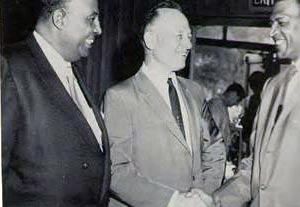 His accolades and awards were extensive and far too numerous to list. Dr. Earl Carl was a legend who followed through on his commitment to making Thurgood Marshall School of Law a law school “of the first class.” When offered opportunities to leave the school he loved, he always refused. He saw Thurgood Marshall as his life, and everyone benefited from his passion for his work. He was the epitome of “keep a goal within [yourself] in good times and bad,” a mantra he instilled in all those who had the honor to make his acquaintance. His students considered him brilliant yet humble. His peers found him to be a kind and knowledgeable individual capable of being both teacher and student at any given moment. He came to champion a movement, and he never quit, and for that everyone at TMSL, past and present, are forever grateful.
His accolades and awards were extensive and far too numerous to list. Dr. Earl Carl was a legend who followed through on his commitment to making Thurgood Marshall School of Law a law school “of the first class.” When offered opportunities to leave the school he loved, he always refused. He saw Thurgood Marshall as his life, and everyone benefited from his passion for his work. He was the epitome of “keep a goal within [yourself] in good times and bad,” a mantra he instilled in all those who had the honor to make his acquaintance. His students considered him brilliant yet humble. His peers found him to be a kind and knowledgeable individual capable of being both teacher and student at any given moment. He came to champion a movement, and he never quit, and for that everyone at TMSL, past and present, are forever grateful.
Forever intrigued by an opportunity to learn, at the height of his career, Carl returned to the humble role of student in order to earn his Master of Laws Degree (LLM). Thereafter, Fisk (the university which once rejected him) awarded him an honorary doctorates degree in law.
After 38 years of advocacy and teaching, Carl retired. Some 6 years after his retirement in November 1992, the Earl Carl Institute for Legal & Social Policy, Inc. was created to help law students hone their research and writing skills by writing about legal and social problems affecting underserved and underrepresented communities.
Professor Carl serves as a symbol to ECI students that they can accomplish whatever they are willing to despite all odds. His achievements remind us that we are limited only by the barriers we chose not to overcome.
Dr. Earl Lawrence Carl died on March 30, 1996, at the age of 77. A visionary, a leader, a legend, his legacy lives on as the Earl Carl Institute strives to continue creating a new vision for legal and social justice.









